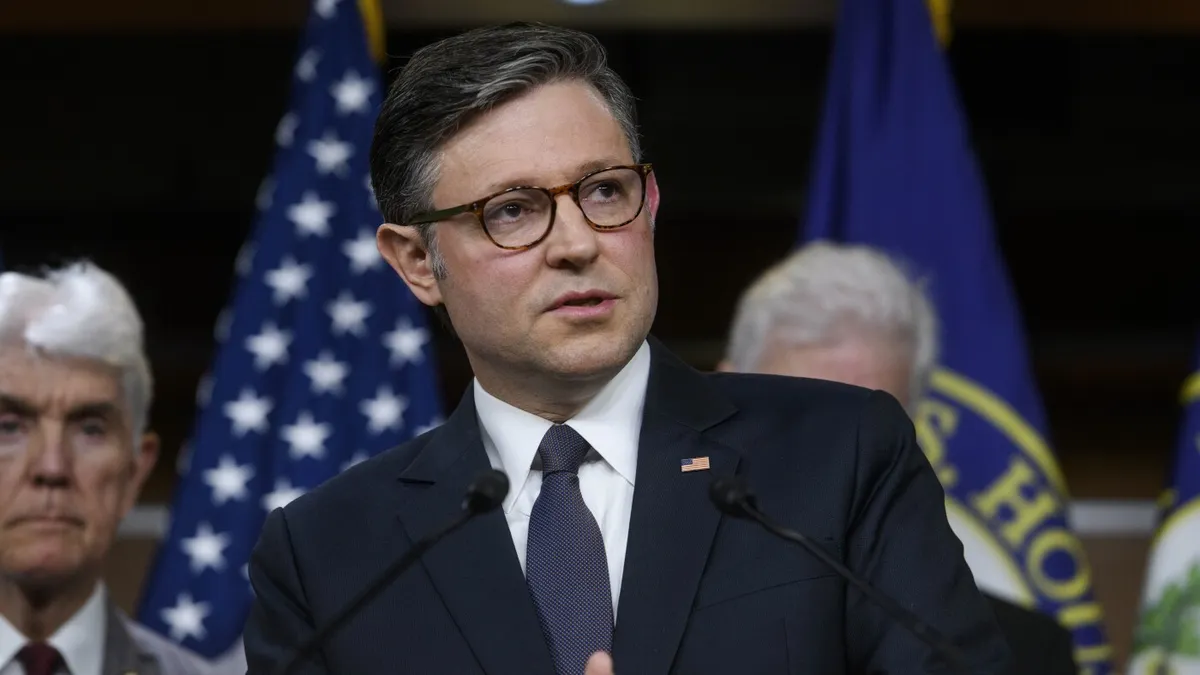
In a significant move, Republicans advanced their extensive tax cut and border security package out of a crucial House committee during a rare Sunday night vote. This development comes after deficit hawks, who had previously blocked the measure two days earlier, allowed it to proceed, citing progress in negotiations concerning the package's spending cuts.
House Speaker Mike Johnson met with Republican lawmakers shortly before the committee meeting, where he indicated that some changes had been agreed upon, though he did not disclose specific details. Johnson described these adjustments as minor, stating they were "not a huge thing." Democrats on the committee pressed for more information, but Rep. Jodey Arrington, the chairman of the House Budget Committee, emphasized that the bill remains under negotiation. "Deliberations continue at this very moment," Arrington remarked, indicating that discussions would extend throughout the week as they work towards presenting the bill on the House floor.
The final vote saw four conservatives, who had expressed concerns about the bill's potential impact on the deficit, choosing to vote present. This strategic decision allowed the measure to advance with a narrow vote of 17-16. While further discussions are anticipated, Johnson aims to bring the bill to the House floor by the week's end. "This is the vehicle through which we will deliver on the mandate that the American people gave us in the last election," he stated during an appearance on Fox News Sunday.
In the previous attempt to advance the bill out of the House Budget Committee, deficit hawks collaborated with Democratic lawmakers to defeat the measure. Critics within the Republican party have raised alarms about the bill's structure, highlighting that new spending and tax cuts are front-loaded, while the measures intended to offset these costs are back-loaded. There is a push to expedite the implementation of new work requirements for able-bodied participants in Medicaid, which under the current proposal would not take effect until 2029.
Rep. Chip Roy of Texas, a committee member, voiced strong concerns, stating, "We are writing checks we cannot cash, and our children are going to pay the price. Something needs to change, or you're not going to get my support." Johnson defended the delayed start date for the work requirements, asserting it provides states with adequate time to adjust their systems and ensure enforcement of new laws and safeguards.
Rep. Ralph Norman of South Carolina, along with his colleagues Josh Brecheen of Oklahoma and Andrew Clyde of Georgia, had previously voted against the bill. Rep. Lloyd Smucker of Pennsylvania changed his vote to no in a procedural maneuver to allow for a future reconsideration. Following the Sunday vote, Roy tweeted about the bill's potential to advance Medicaid work requirements while also criticizing the limitations on future subsidies related to green energy tax breaks from the Inflation Reduction Act. He cautioned, however, that the bill still requires more modifications to meet current demands.
Norman cited a recent downgrade of the nation's credit rating as a basis for advocating steeper reductions. "We've got a lot more work to do," he remarked. "We're excited about what we did. We want to move the bill forward." At the heart of this extensive legislative package is the permanent extension of existing income tax cuts approved during former President Trump's first term in 2017, alongside temporary new cuts that align with the president's 2024 campaign promises, including exemptions on taxes for tips, overtime pay, and auto loan interest.
The proposed measure also includes substantial increases in spending for border security and defense. The Committee for a Responsible Federal Budget, a nonpartisan fiscal watchdog, estimates that the House bill could add approximately $3.3 trillion to the national debt over the next decade. The measure faces overwhelming opposition from Democrats, with Rep. Pramila Jayapal of Washington labeling it a "big, beautiful betrayal" during a Friday hearing. Rep. Jim Clyburn of South Carolina articulated concerns about the bill's implications for working Americans, stating, "There is nothing wrong with us bringing the government in balance. But there is a problem when that balance comes on the back of working men and women."
Speaker Johnson is not only addressing the concerns of deficit hawks but also facing scrutiny from centrists who are wary of proposed changes to Medicaid and food assistance programs, as well as the rollback of clean energy tax credits. Lawmakers from New York and other regions are advocating for an increase in the state and local tax deduction, with the current bill proposing to triple the existing $10,000 cap to $30,000 for joint filers earning up to $400,000. Rep. Nick LaLota, a leading advocate for this change, has suggested a deduction of $62,000 for single filers and $124,000 for joint filers.
If the bill successfully passes the House this week, it will then move to the Senate, where Republican lawmakers are also considering changes that could complicate its final passage.